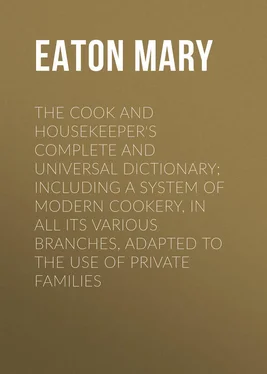Mary Eaton - The Cook and Housekeeper's Complete and Universal Dictionary; Including a System of Modern Cookery, in all Its Various Branches, Adapted to the Use of Private Families
Здесь есть возможность читать онлайн «Mary Eaton - The Cook and Housekeeper's Complete and Universal Dictionary; Including a System of Modern Cookery, in all Its Various Branches, Adapted to the Use of Private Families» — ознакомительный отрывок электронной книги совершенно бесплатно, а после прочтения отрывка купить полную версию. В некоторых случаях можно слушать аудио, скачать через торрент в формате fb2 и присутствует краткое содержание. Издательство: Иностранный паблик, Жанр: foreign_antique, foreign_prose, на английском языке. Описание произведения, (предисловие) а так же отзывы посетителей доступны на портале библиотеки ЛибКат.
- Название:The Cook and Housekeeper's Complete and Universal Dictionary; Including a System of Modern Cookery, in all Its Various Branches, Adapted to the Use of Private Families
- Автор:
- Издательство:Иностранный паблик
- Жанр:
- Год:неизвестен
- ISBN:нет данных
- Рейтинг книги:5 / 5. Голосов: 1
-
Избранное:Добавить в избранное
- Отзывы:
-
Ваша оценка:
- 100
- 1
- 2
- 3
- 4
- 5
The Cook and Housekeeper's Complete and Universal Dictionary; Including a System of Modern Cookery, in all Its Various Branches, Adapted to the Use of Private Families: краткое содержание, описание и аннотация
Предлагаем к чтению аннотацию, описание, краткое содержание или предисловие (зависит от того, что написал сам автор книги «The Cook and Housekeeper's Complete and Universal Dictionary; Including a System of Modern Cookery, in all Its Various Branches, Adapted to the Use of Private Families»). Если вы не нашли необходимую информацию о книге — напишите в комментариях, мы постараемся отыскать её.
The Cook and Housekeeper's Complete and Universal Dictionary; Including a System of Modern Cookery, in all Its Various Branches, Adapted to the Use of Private Families — читать онлайн ознакомительный отрывок
Ниже представлен текст книги, разбитый по страницам. Система сохранения места последней прочитанной страницы, позволяет с удобством читать онлайн бесплатно книгу «The Cook and Housekeeper's Complete and Universal Dictionary; Including a System of Modern Cookery, in all Its Various Branches, Adapted to the Use of Private Families», без необходимости каждый раз заново искать на чём Вы остановились. Поставьте закладку, и сможете в любой момент перейти на страницу, на которой закончили чтение.
Интервал:
Закладка:
BEEF STEAKS. To have them fine, they should be cut from a rump that has hung a few days. Broil them over a very clear or charcoal fire; put into the dish a little minced shalot, a table-spoonful of ketchup. The steak should be turned often, that the gravy may not be drawn out on either side. This dish requires to be eaten so hot and fresh done, that it is not in perfection if served with any thing else. Pepper and salt should be added when taking it off the fire, and a bit of butter rubbed on at the moment of serving. If accompanied with oyster sauce, strain off the liquor from the oysters, and throw them into cold water to take off the grit, while you simmer the liquor with a bit of mace and lemon peel. Then put in the oysters, stew them a few minutes, add a little cream, and some butter rubbed in a bit of flour. Let them boil up once, and throw the sauce over the steaks at the moment of sending the dish to table.
BEEF STEW. Cut into small pieces four or five pounds of beef, with some hard fat. Put these into a stewpan, with three pints of water, a little salt and pepper, a sprig of sweet herbs, and three cloves. Cover the pan very close, and let it stew four hours over a slow fire. Throw in some carrots and turnips, cut into square pieces; the white part of a leek, with two heads of celery chopped fine; a crust of bread, and two spoonfuls of vinegar. When done, put it into a deep dish, set it over hot water, and cover it close. Skim the gravy, and put in a few pickled mushrooms; thicken it with flour and butter, make it hot, and pour it over the beef.
BEEF TEA. Cut a pound of fleshy beef into thin slices; simmer it with a quart of water twenty minutes, after it has once boiled, and been skimmed. Season it, if approved; but a little salt only is sufficient.
BEEF VINGRETTE. Cut a slice of under-done boiled beef three inches thick, and a little fat. Stew it in half a pint of water, a glass of white wine, a bunch of sweet herbs, an onion, and a bay leaf. Season it with three cloves pounded, and pepper, till the liquor is nearly wasted away, turning it once. Serve it up cold. Strain off the gravy, and mix it with a little vinegar for sauce.
BEER. During the present ruinous system of taxation, it is extremely difficult, though highly desirable, to procure a cheap and wholesome beverage, especially for the labouring part of the community, to whom it is as needful as their daily food. Beer that is brewed and drunk at home, is more pure and nutricious than what is generally purchased at an alehouse; and those who cannot afford a better article, may perhaps find it convenient to adopt the following method for obtaining some cheap drink for small families. – To half a bushel of malt, add four pounds of treacle, and three quarters of a pound of hops. This will make twenty-five gallons of wholesome beer, which will be fit for use in a fortnight; but it is not calculated for keeping, especially in warm weather. Beer brewed in this way will not cost one halfpenny a pint. An agreeable table beer may be made ready for drinking in three or four days, consisting of treacle and water, fermented with a little yeast. Boil six or seven gallons of water, pour it on the same quantity of cold water in a cask, and a gallon of treacle. Stir them well together; and when the fermentation is abated, close the bung-hole in the usual way. A little of the outer rind of an orange peel infused into the beer, and taken out as soon as it has imparted a sufficient degree of bitterness, will give it an agreeable flavour, and assist in keeping the beer from turning sour. A little gentian root boiled in the water, either with or without the orange peel, will give a wholesome and pleasant bitter to this beer. A small quantity, by way of experiment, may be made thus. To eight quarts of boiling water, put one ounce of treacle, a quarter of an ounce of ginger, and two bay leaves. Let the whole boil a quarter of an hour; then cool and work it with yeast, the same as other beer. Another way to make a cheap malt liquor is to take a bushel of malt, with as much water and hops as if two bushels of malt were allowed in the common way, and put seven pounds of the coarsest brown sugar into the boiling wort. This makes a very pleasant liquor; is as strong, and will keep as long without turning sour or flat, as if two bushels had been employed. Twenty gallons of good beer may be made from a bushel of malt, and three quarters of a pound of hops, if care be taken to extract all their goodness. For this purpose boil twenty-four gallons of water, and steep the malt in it for three hours: then tie up the hops in a hair cloth, and boil malt, hops, and wort, all together for three quarters of an hour, which will reduce it to about twenty gallons. Strain it off, and set it to work when lukewarm. See Brewing. – As however it does not suit some persons to brew, in any way whatever, it may be necessary to add a few brief remarks on the distinguishing qualities of sound beer, that persons may know what it is they purchase, and how far their health may be affected by it. Wholesome beer then ought to be of a bright colour, and perfectly transparent, neither too high nor too pale. It should have a pleasant and mellow taste, sharp and agreeably bitter, without being hard or sour. It should leave no pungent sensation on the tongue; and if drank in any tolerable quantity, it must neither produce speedy intoxication, nor any of the usual effects of sleep, nausea, headache, or languor; nor should it be retained too long after drinking it, or be too quickly discharged. If beer purchased at the alehouse be suspected of having been adulterated with the infusion of vitriol, for the purpose of adding to its strength, it may be detected by putting in a few nut galls, which will immediately turn it black, if it have been so adulterated; and the beer ought by all means to be rejected, as highly injurious to the constitution, and may be fatal even to life itself.
BEES. A hive of bees may be considered as a populous city, containing thirty thousand inhabitants. This community is in itself a monarchy, composed of a queen, of males which are the drones, and of working bees called neuters. The combs being composed of pure wax, serve as a magazine for their stores, and a nursery for their young. Between the combs there is a space sufficient for two bees to march abreast, and there are also transverse defiles by which they can more easily pass from one comb to another. – The queen bee is distinguishable from the rest by the form of her body. She is much longer, unwieldy, and of a brighter colour, and seldom leaves the parent hive; but when she goes to settle a new colony, all the bees attend her to the place of destination. A hive of bees cannot subsist without a queen, as she produces their numerous progeny; and hence their attachment to her is unalterable. When a queen dies, the bees immediately cease working, consume their honey, fly about at unusual times, and eventually pine away, if not supplied with another sovereign. The death of the queen is proclaimed by a clear and uninterrupted humming, which should be a warning to the owner to provide the bees if possible with another queen, whose presence will restore vigour and exertion; of such importance is a sovereign to the existence and prosperity of this community. It is computed that a pregnant queen bee contains about five thousand eggs, and that she produces from ten to twelve thousand bees in the space of two months. – Drones are smaller than the queen, but larger than the working bees, and when on the wing they make a greater noise. Their office is to impregnate the eggs of the queen after they are deposited in the cells; but when this is effected, as they become useless to the hive, they are destroyed by the working bees and thrown out; and having no sting, they are without the power of resistance. After the season of the encrease of the bees is past, and when they attend to the collection of winter stores, every vestige of the drones is destroyed to make room for the honey. When drones are observed in a hive late in autumn, it is usually a sign that the stock is poor. – Working bees compose the most numerous body of the state. They have the care of the hive, collect the wax and honey, fabricate the wax into combs, feed the young, keep the hive clean, expel all strangers, and employ themselves in promoting the general prosperity. The working bee has two stomachs, one to contain the honey, and another for the crude wax. Among the different kinds of working bees, those are to be preferred which are small, smooth, and shining, and of a gentle disposition. – Considering the rich productions of these little insects, and the valuable purposes to which they may be applied, it is truly astonishing that so important an object in rural economy has been so little attended to by the inhabitants of this country. In Egypt, the cultivation of bees forms a leading object, and their productions constitute a part of its riches. About the end of October, when sustenance cannot be provided for them at home, the inhabitants of Lower Egypt embark their bees on the Nile, and convey them to the distant regions of Upper Egypt, when the inundation is withdrawn, and the flowers are beginning to bud. These insects are thus conducted through the whole extent of that fertile country; and after having gathered all the rich produce of the banks of the Nile, are re-conducted home about the beginning of February. In France also, floating bee-hives are very common. One barge contains from sixty to a hundred hives, which are well defended from the inclemency of the weather. Thus the owners float them gently down the stream, while they gather the honey from the flowers along its banks, and a little bee-house yields the proprietors a considerable income. At other times they convey bees by land, to places where honey and wax may be collected. The hives are fastened to each other by laths placed on a thin packcloth, which is drawn up on each side and tied with packthread several times round their tops. Forty or fifty hives are then laid in a cart, and the owner takes them to distant places where the bees may feed and work. But without this labour the industrious bee might be cultivated to great advantage, and thousands of pounds weight of wax and honey collected, which now are suffered to be wasted on the desert air, or perish unheeded amidst the flowers of the field. – Those whose attention may be directed to the subject by these remarks, and who intend to erect an apiary, should purchase the stocks towards the close of the year, when bees are cheapest; and such only as are full of combs, and well furnished with bees. To ascertain the age of the hives it should be remarked, that the combs of the last year are white, while those of the former year acquire a darkish yellow. Where the combs are black, the hive should be rejected as too old, and liable to the inroads of vermin. In order to obtain the greatest possible advantage from the cultivation of bees, it is necessary to supply them with every convenience for the support of themselves and their young. And though it may be too much trouble to transport them to distant places, in order to provide them with the richest food, and to increase their abundant stores; yet in some instances this plan might in part be adopted with considerable success. It has been seen in Germany, as well as in other parts of the continent, that forty large bee hives have been filled with honey, to the amount of seventy pounds each, in one fortnight, by their being placed near a large field of buck wheat in flower; and as this and various other plants adapted to enrich the hive are to be found in many parts of England, there is no reason why a similar advantage might not be derived from such an experiment. – Besides providing for them the richest food in summer, in order to facilitate their labours, it is equally necessary to attend to their preservation in the winter. To guard against the effects of cold, the bees should be examined during the winter; and if instead of being clustered between the combs, they are found in numbers at the bottom of the hive, they should be carried to a warmer place, where they will soon recover. In very severe seasons, lay on the bottom of an old cask the depth of half a foot of fine earth pressed down hard; place the stool on this with the hive, and cut a hole in the cask opposite to the entrance of the hive, in which fix a piece of reed or hollow elder, and then cover the whole with dry earth. This will preserve a communication with the external air, and at the same time keep out the cold. The bees remaining in a torpid state during the winter, they require but little food; but as every sunny day revives and prompts them to exercise, a small supply is necessary on these occasions. Many hives of bees which are supposed to have died of cold, have in reality perished by famine, especially when a rainy summer prevented them from collecting a sufficient store of provision. Hence the hives should be carefully examined in autumn, and ought then to weigh at least eighteen pounds each. When bees require to be fed, the honey should be diluted with water, and put into an empty comb, split reeds, or upon clear wood, which the bees will suck perfectly dry. But it is a much better way to replenish the weak hives in September, with such a portion of combs filled with honey taken from other hives as may be deemed a sufficient supply. This is done by turning up the weak hive, cutting out the empty combs, and placing full ones in their stead, so secure as not to fall down when the hive is replaced. If this be too troublesome, a plate of honey may be set under the hive, and straws laid across the plate, covered with paper perforated with small holes, through which the bees will suck the honey without difficulty. – These valuable insects are liable to various disorders, both from the food they eat, from foreign enemies, and from one another. If they have fed greedily on the blossoms of the milk thistle or the elm, it will render them incapable of working, and the hive will be stained with filth. The best cure in this case is pounded pomegranate seed, moistened with sweet wine; or raisins mixed with wine or mead, and the infusion of rosemary. When they are infested with vermin, the hive must be cleansed, and perfumed with a branch of pomegranate or the wild fig-tree, which will effectually destroy them. Butterflies sometimes conceal themselves in the hives, and annoy the bees; but these intruders may easily be exterminated by placing lighted candles in deep tin pots between the hives, as they will be attracted by the flame, and so perish. In order to extirpate wasps and hornets preying upon the honey, it is only necessary to expose shallow vessels near the hive with a little water, to which those depredators eagerly repair to quench their thirst, and thus easily drown themselves. To prevent bees of one society from attacking or destroying those of another, which is frequently the case, the following method may be tried. Let a board about an inch thick be laid on the bee bench, and set the hive upon it with its mouth exactly on the edge. The mouth of the hive should also be contracted to about an inch in length, and a semicircular hole made in the board immediately under the mouth of the hive. By this simple method, the bees which come to make the attack will be foiled, and constrained to act with great disadvantage. If this do not succeed, remove the hive to a distant part of the garden, and to a more easterly or colder aspect, which will frequently end the contest. – When bees are to be taken up for the purpose of obtaining the wax and honey, great care should be taken not to destroy the insects; and for this end the following method is recommended. The upper box on the hive, which principally contains the honey, is first to be taken off. The joint should be loosened, the cement scraped off, and then a piece of iron wire to be drawn through the comb so as to divide it. When the upper box is thus separated, its cover is to be taken off and immediately placed on the second box, which is now the highest. Having taken out the contents of the box which has been separated, it is to be placed again on the stand, under the lower box, and its door only is to be left open. If any bees remain in the box when taken away, a little smoke will drive them out, and they will quickly return to their own hive. In this manner a second or a third box of honey may be removed in succession, when the lower part of the hive appears to be full; but care must be taken not to deprive the bees entirely of the stock which they have collected for the winter. In taking up a common straw hive of bees, the best way is to remove it into a darkened room, that it may appear to the bees as if it were late in the evening. Then gently turning the hive bottom upwards, and supporting it in that position, cover it with an empty hive a little raised towards the window, to give the bees sufficient light to guide their ascent. Keep the empty hive steadily supported on the edge of the full hive, and strike the hand round the full hive to frighten the bees, till they have nearly all ascended into the other. The new hive containing the bees must be placed on the stand of the apiary, to receive the absent bees as they return from the fields.
Читать дальшеИнтервал:
Закладка:
Похожие книги на «The Cook and Housekeeper's Complete and Universal Dictionary; Including a System of Modern Cookery, in all Its Various Branches, Adapted to the Use of Private Families»
Представляем Вашему вниманию похожие книги на «The Cook and Housekeeper's Complete and Universal Dictionary; Including a System of Modern Cookery, in all Its Various Branches, Adapted to the Use of Private Families» списком для выбора. Мы отобрали схожую по названию и смыслу литературу в надежде предоставить читателям больше вариантов отыскать новые, интересные, ещё непрочитанные произведения.
Обсуждение, отзывы о книге «The Cook and Housekeeper's Complete and Universal Dictionary; Including a System of Modern Cookery, in all Its Various Branches, Adapted to the Use of Private Families» и просто собственные мнения читателей. Оставьте ваши комментарии, напишите, что Вы думаете о произведении, его смысле или главных героях. Укажите что конкретно понравилось, а что нет, и почему Вы так считаете.












![John Bruce - The Lettsomian Lectures on Diseases and Disorders of the Heart and Arteries in Middle and Advanced Life [1900-1901]](/books/749387/john-bruce-the-lettsomian-lectures-on-diseases-and-disorders-of-the-heart-and-arteries-in-middle-and-advanced-life-1900-1901-thumb.webp)